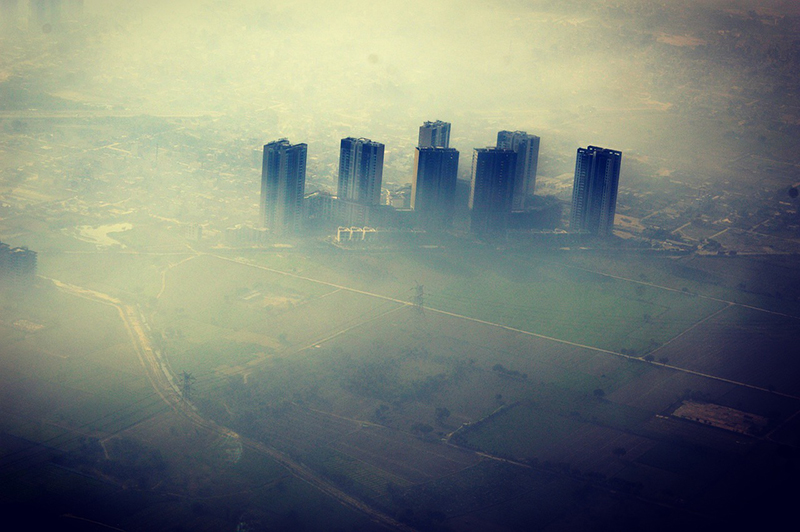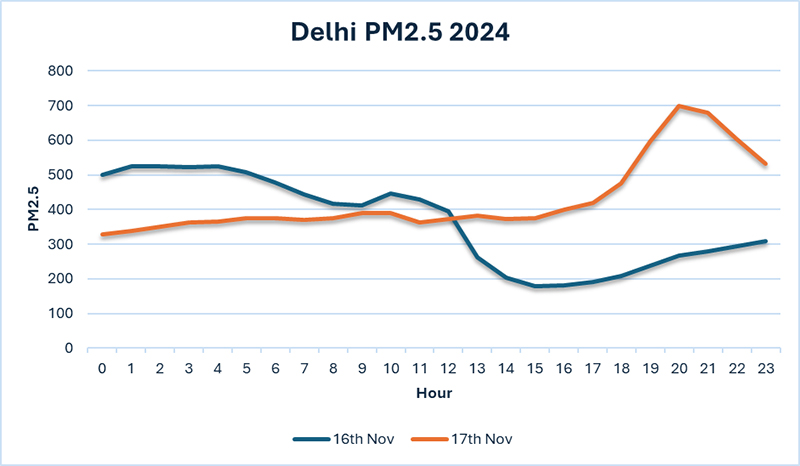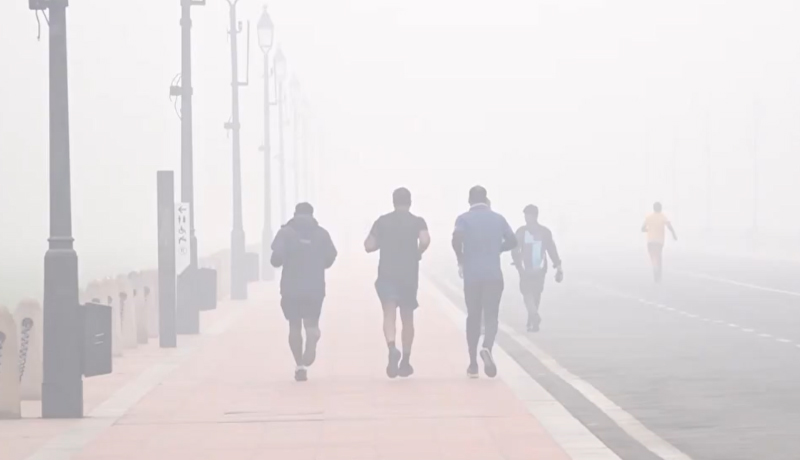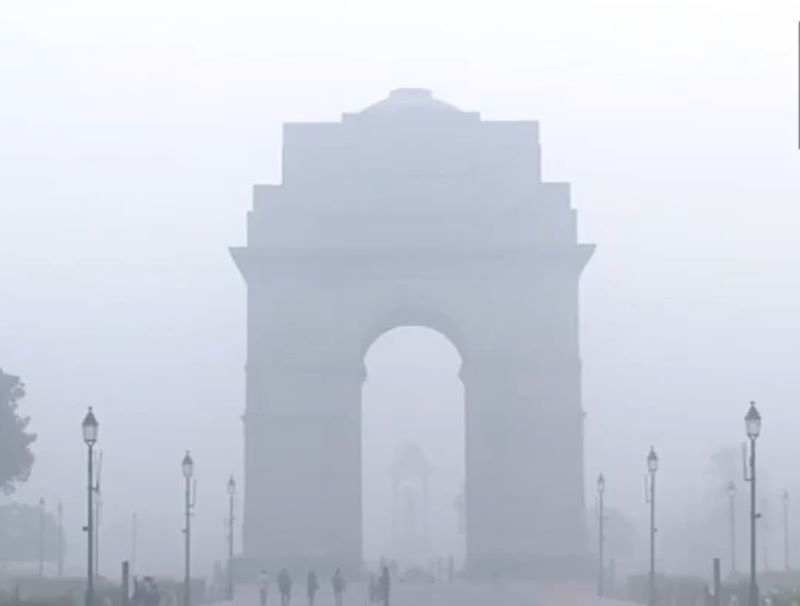 Pollution
Pollution
Toxic air and smog choke Delhi as experts at COP29 in Baku warn how dragging feet on fossil fuel reduction can cause catastrophe
Baku/New Delhi / IBNS: The ongoing air pollution crisis in South Asia is a grim reminder of what is at stake and the urgent need for countries to reduce dependence on fossil fuels, experts observed at the ongoing COP29 climate conference in Azerbaijan's Baku amid the deteriorating Air Quality Index (AQI) in Delhi triggering an environmental crisis.
Experts from the global health community including physicians, medical students, and public health came together to discuss the emergency that fossil fuel pollution and climate change pose to human health and the urgency for countries to chart a future that is not dependent on fossil fuels.
They recognised Monday (Nov 18) as Health Day as citizens of north India and the regional South Asia airshed woke up to abysmal air quality making it difficult to breathe.
There is broad consensus from the health community on the need to phase out fossil fuels, redirect health-harming subsidies from the sector and apply some of the lessons learnt from tobacco control to apply also to fossil fuels.
"An ambitious finance target is essential to support healthy and just transitions to renewable energy, as well as to enable adaptation across health and health-determining sectors and to respond to health losses and damages," experts observed, according to New Delhi-based research and consulting body Climate Trends.
The fossil fuel industry's presence in UNFCCC negotiations undermines climate action, echoing the tobacco industry's interference in public health policies, it said.
Delhi air pollution:
The concern by global health experts comes at a time when Delhi's air quality has been making headlines after recording the worst air quality index which inched beyond 400 to be labelled as the severe category over the past few days.
The Delhi-National Capital Region experienced the worst AQI on Monday morning as the toxic smog engulfed the union territory causing more worries for the residents.
The AQI plummeted to the 'severe-plus' category reducing the visibility to 150 metres at 5 am. It was 481 at 7 am.
The current AQI prompted the Commission for Air Quality Management (CAQM) to activate Stage-IV of the Graded Response Action Plan (GRAP), which imposes several restrictions, such as a ban on truck entry and a temporary halt on construction at public projects in Delhi and the neighbouring National Capital Region.
AQI is a single number that represents air quality by combining the values of various air pollution parameters. Particulate matter is one of the most prominent pollutants. PM2.5 is particulate matter 2.5 micrometres or less in diameter. According to India’s pollution regulatory body, the Central Pollution Control Board, the maximum permissible limit for PM2.5 annually is 40 micrograms per cubic meter (μg/m3), and the daily safe limit is 60 μg/m3.
 Delhi’s hourly PM2.5 on Nov 16 and 17. Photo courtesy: Central Pollution Control Board
Delhi’s hourly PM2.5 on Nov 16 and 17. Photo courtesy: Central Pollution Control Board
The World Health Organisation’s safety limits for PM2.5 concentration are even stricter. The maximum permissible PM2.5 average concentration in 24 hours is 15 ug/m3 and 5 ug/m3 annually.
Given the serious threats the current AQI poses to residents of Delhi and NCR, all schools in the region have been ordered to shift to an online mode of teaching.
All senior classes including standards 10 and 12 in Delhi and the National Capital Region have been shifted to online mode of classes, a government order stated on Monday.
 Residents of Delhi jogging braving the air pollution. Photo courtesy: Screenshot grab from X video
Residents of Delhi jogging braving the air pollution. Photo courtesy: Screenshot grab from X video
Besides the Delhi government, the Haryana and Uttar Pradesh governments also suspended physical classes for standards 10 and 12 in Gurugram and Ghaziabad, hours after the Indian Supreme Court directed all states in the NCR to take an immediate call to shift to online lessons.
Climate Trends Director Aarti Khosla said: "Delhi's air quality index today is close to 450 and on an average, and touched 1000 ug/m3 in many parts of the city. The fact that no single source of pollution is going to be the worst, but there will be many, which will include black carbon, ozone, fumes from fossil burning, fumes from burning of farm fires, etc, should make us look at solutions which are also multidisciplinary."
"As temperatures drop in a La Nina year, the wind circulation has also been quite poor, leaving pollutants to hang in the air. We are all gathered here to talk about bigger issues that affect our climate and countries are dragging their feet so much when the lives and health of millions are at risk. We need to be urgently responsive to the realities of climate change that the world is facing today," she said.
Dr Arvind Kumar, Chest Surgeon and Founder of Lung Care Foundation and Doctors for Clean Air said: "Polluted air is an invisible killer, infiltrating every breath we take and quietly wreaking havoc on our health. From triggering asthma attacks in children to fuelling heart disease, lung cancer, and cognitive decline, the impact of emissions transcends generations, leaving vulnerable communities to bear the brunt."
"8.1 million premature deaths are attributable to air pollution. We need a concerted political effort to end this catastrophe, phase out fossil fuels, and prioritize clean energy. Without decisive action, we are sacrificing both our health and our future," he said.
 In image a smog-marred national capital. Courtesy: Videograb from X
In image a smog-marred national capital. Courtesy: Videograb from X
Speaking at the COP29, Dr Courtney Howard, Vice-Chair, Global Climate and Health Alliance (GCHA) said: "Where I live, in fact, we had the highest levels of air pollution from wildfires. In 2023, 70% of the population of my territory was evacuated due to severe wildfires. It required a military evacuation plane to take our patients thousands of kilometres south to Vancouver. But that is expensive. This is a high income country and we have the ability to go to our federal government for help.
"But in lower income countries and small island developing states, they require grants to deal with such increasing disasters. We are giving $1 trillion in subsidies to giant multinational corporations who are making record profits but we are told there isn't enough money for health care. We need to fund health and health care to preserve health for current and future generations.
While Delhi air pollution dominated the talks, Breathe Mongolia co-founder Enkhun Byambadorj, said Mongolia no longer has a winter season but rather has an air pollution season.
"A child living in a city versus a rural area has 40% lower lung function capacity due to air pollution. But we need to address this problem holistically.
"The narrative in support of fossil fuels focusses on strong economic development and growth as the only parameter of success. We need to re-frame this narrative and discourse. The air we breathe is a choice we make as a society at the expense of our young children and the future of everyone," Byambadorj said.
Support Our Journalism
We cannot do without you.. your contribution supports unbiased journalism
IBNS is not driven by any ism- not wokeism, not racism, not skewed secularism, not hyper right-wing or left liberal ideals, nor by any hardline religious beliefs or hyper nationalism. We want to serve you good old objective news, as they are. We do not judge or preach. We let people decide for themselves. We only try to present factual and well-sourced news.







